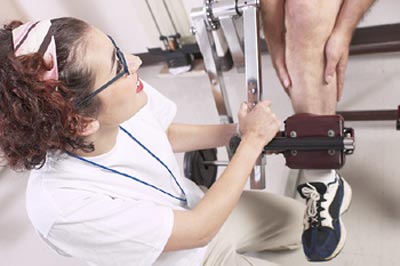Nicola: So, Cat, I'd like to ask you more about your job. What exactly does an O. T. do?
Cat: Occupational therapists work with people who have had accidents or disabilities, help them regain function and so that they can be independent in the activities that they enjoy doing, so the occupation and occupational therapies, the activities people enjoy doing every day and it looks into, instead of physiotherapy works with just the muscles and building muscles, so they just do repetitions, but occupational therapy incorporates things that people actually enjoy doing into the activities for therapy, if that makes sense. It's kind of broad but yeah!
Nicola: So, it's kind of getting them back into their own life, their normal life? So, for example, if they've had an accident, is it or, for young people or old, or?
Cat: Yeah, it's the whole span of people, but um, yeah, people, for instances if a child has had an accident their main occupation is play so, you want to get them back into as much play as they can, and get them as strong as you can, so you can do that through play, but an adult you want to try and get them back into, say if they enjoy sewing or riding or surfing or those kinds of activities, as the O. T. you try to incorporate that into the therapy that you do with them, as much as you can. It depends on their injury.
Nicola: OK, so where are you working now as an O. T.?
Cat: Right now, I'm working in hospital at Lismore, and it's more of an acute care setting so people who have had major injuries or accidents and it's pretty much just helping them move on to the next step, either going home or going to another hospital and organizing the things that they need to be able to get back to the activities of daily living. (Wow) It's kind of complicated, but that's the basics of it, but it's a little bit more than that.
Nicola: That sounds pretty challenging.
Cat: Yeah, it's good.
Nicola: OK, so thanks for talking to us and all the best in your work.
function
Occupational therapists work with people who have had
accidents or disabilities, help them regain function.
'Function,' in this case, refers to the ability that
someone has to work and be a normal member of society.
'Function' is literally what something is used for or the
purpose it serves.
Notice the following:
- I laughed so hard I could not function.
- It takes a while for my body to function in the
mornings!
repetition
Physiotherapy works with just the muscles and building
muscles, so they just do repetitions.
'Repetition' is repeating the same action many times.
Notice the following:
- I need to do 50 repetitions of my sit ups.
- I find work very boring. It is the repetition of the
same old things.
play
Their main occupation is play so, you want to get them back
into as much play as they can.
When you 'play' you have fun through amusing activities. We
use this verb to refer mostly to what children do or games.
Notice the following:
- I love playing board games, they are so much fun.
- The children play really well together, don't you think?
incorporate
As the O. T. you try to incorporate that into the therapy
that you do with them, as much as you can.
When you 'incorporate' something or someone you
intentionally include it in what you are doing.
Notice the following:
- I want to incorporate as many people as I can.
- If we could incorporate all of the exercises into one
routine that would be great.
daily living
Organizing the things that they need to be able to get back
to the activities of daily living.
'Daily living' describes what you do when you go about your
normal day to day life.
Notice the following:
- I need help with my daily living as I am quite old now.
- Since I got injured, my daily living has become harder
to manage.
Vocabulary Quiz
incorporate • daily living


















